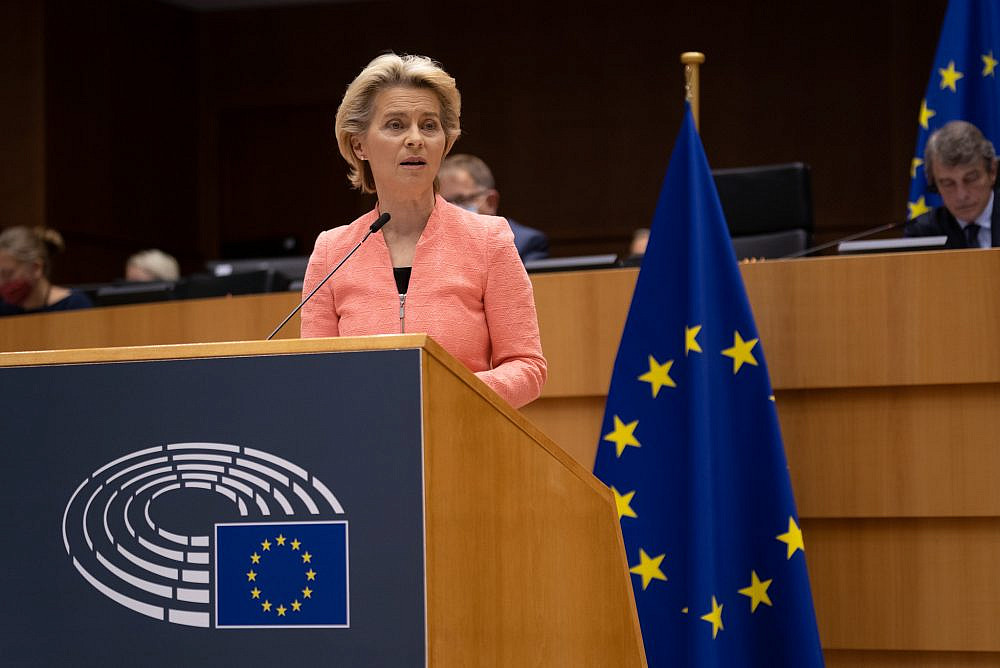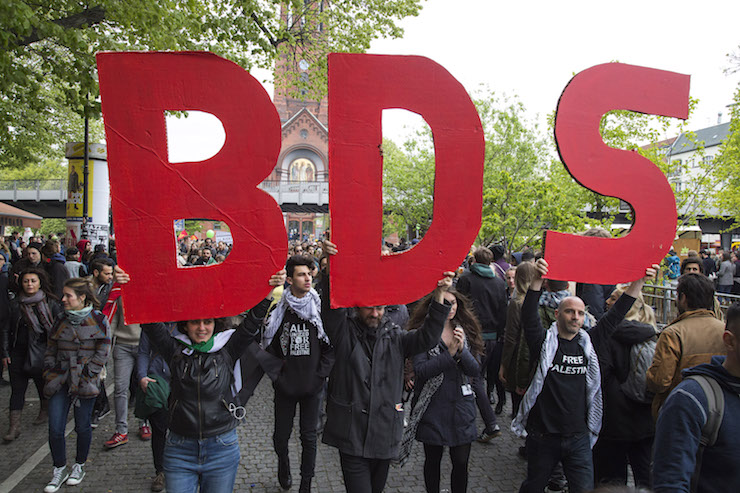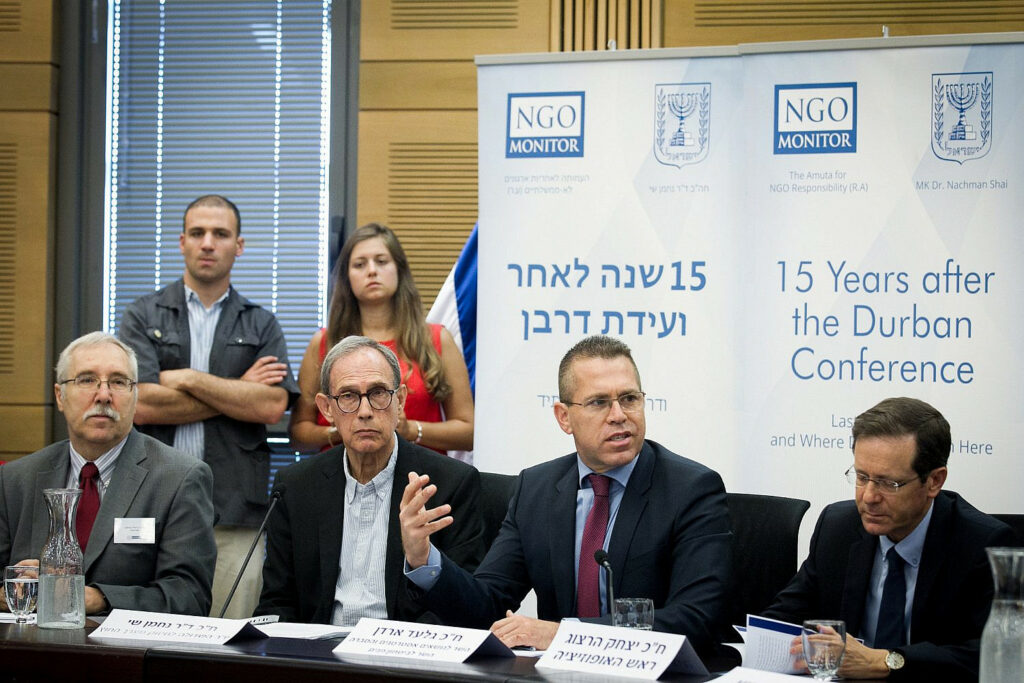Why Is the EU Helping to Label Israel Criticism as Antisemitism?
PALESTINE - ISRAEL, 26 Apr 2021
Amb. Ilan Baruch | +972 Mag - TRANSCEND Media Service
By adopting the IHRA definition, the EU is playing into the agendas of Israel advocacy groups that undermine civil society work against the occupation.

European Commission President Ursula von der Leyen delivers her first State of the EU address at the European Parliament in Brussels. September 16, 2020.
(European Parliament/CC-BY-4.0)
19 Apr 2021 – Since the International Holocaust Remembrance Alliance (IHRA) adopted its “working definition of antisemitism” in May 2016, various Israeli organizations — some of them with reported links to the Israeli government — have been promoting the definition with the aim of discrediting and undermining civil society work challenging Israel’s occupation of Palestine.
One of these groups is NGO Monitor, which has been criticized for targeting the funding sources of organizations that are critical of Israel. Another is the International Legal Forum (ILF), a legal network that is seen to be countering international pressure against Israeli government policies. Both groups have been part of a wider campaign in recent years that has led to the shrinking of civic space for rights-based advocacy and activism on Israel and Palestine.
The IHRA definition has become a major project for these Israel advocacy organizations. In recent weeks, the ILF, for example, helped organize an open letter by scholars in support of the definition. The definition also features prominently in the ILF’s recent report, “Antisemitism & De-Legitimization.” The group even has a dedicated webpage promoting a legal analysis that argues the definition “provides, for the first time in historic (sic), an objective standard to identify the antisemitic motives or objectives behind discriminatory acts” and to “clearly identify and understand what constitutes antisemitism.”
However, the IHRA definition is hardly an objective standard. As many critics have highlighted, the definition lacks clarity and demarcation, which makes it vulnerable to misinterpretation and manipulations. Even more susceptible to arbitrary use are the eleven “contemporary examples of antisemitism” attached to the IHRA definition, seven of which relate to Israel.
These Israel-related examples appear to be one of the primary reasons why groups like the ILF are so eagerly promoting the IHRA definition. Indeed, the ILF doesn’t treat the IHRA definition as a symbolic statement — it wants it to be practically applied by government agencies and officials, including the police, public prosecutors, and judges.
Operationalizing the definition
Regrettably, the European Commission played into the ILF’s and NGO Monitor’s agendas when, on January 7, 2021, it published a “Handbook for the practical use of the IHRA working definition of antisemitism.” The handbook represents an ambitious action plan for the operationalization and entrenchment of the IHRA definition across multiple policy areas, from education to justice to civil society funding.
A coalition of progressive Belgian NGOs, unions, and solidarity groups, called “11.11.11,” responded with a useful and informative briefing paper raising eight concerns about this handbook, some of which are summarized below.
While the handbook was published with the European Commission’s official logo, it was in fact authored by RIAS (the Federal Association of Departments for Research and Information on Antisemitism), a body funded by Germany’s antisemitism czar, Dr. Felix Klein, who operates under the country’s Interior Ministry. Klein has been a driving force in Germany behind the political instrumentalization of the fight against antisemitism, particularly against groups supportive of BDS, resulting in calls for his resignation.
According to the handbook, RIAS relied on a number of politically motivated stakeholders to produce its contents. One of the listed contributors is the government affairs director at the Simon Wiesenthal Center, which publishes an annual list of the “Top 10 Worst Anti-Semitic Events.”
Several editions of this list featured events that have little to do with antisemitism. For example, in 2015, the Wiesenthal Center listed the European Union as antisemitic for its decision to label Israeli settlement products. In 2016, France was placed on the list for the same reason. In 2018, the center listed a German bank as antisemitic for hosting the account of a Jewish group that supports BDS. In 2019, it branded Germany’s UN Ambassador Christoph Heusgen as antisemitic following his criticism of Israel in the UN Security Council.
Among the other contributors to the handbook is the chair of the board of IIBSA (the International Institute for Education and Research on Antisemitism), a German organization that published a report in 2018 framing the BDS movement as antisemitic.
Interestingly, the European Commission handbook does not make any mention of BDS by name. However, it does promote as “good practice examples” two resolutions passed by the French and Austrian parliaments that associated BDS with antisemitism. Conveniently for its authors, the handbook does not reference the landmark ruling by the European Court of Justice in June 2020 affirming BDS as free speech.
The handbook’s ambiguity extends beyond BDS. Nowhere does it acknowledge the growing concerns about the IHRA definition and how it is being instrumentalized, as articulated by countless scholars and civil society organizations, including civil liberties groups. Even Kenneth Stern, the main drafter of the IHRA definition, has spoken out against the weaponization of the definition to undermine free speech, particularly at universities.
Far-reaching implications
The effects of the European Commission handbook may have real, practical consequences on those who advocate for Palestinian rights and critique Israeli policy. Firstly, it facilitates the ILF’s agenda to attribute quasi-legal effect to the IHRA definition, including its Israel-related examples. While the handbook acknowledges that the definition is “non-legally binding,” it calls on law enforcement authorities to use the definition to identify, record, analyze, and categorize antisemitic crimes, and to add “references” to the IHRA definition in “hate crime legislation and/or legislation against antisemitism.”
Secondly, the handbook effectively serves NGO Monitor’s ongoing campaign to undermine international funding for NGOs that criticize and challenge the Israeli government. It proposes that governments and international actors introduce conditionality on their funding based on the IHRA definition, suggesting that “initiatives and organizations that base their actions on the [definition]” should be prioritized for financial support. The handbook also recommends that governments and international actors use the definition as a “control mechanism to avoid funding for antisemitic groups and projects” — in other words, to exclude groups or projects perceived as violating the IHRA definition, according to political interpretation.
In this context, the handbook treats the “contemporary examples of antisemitism” as an integral part of the IHRA definition. This contradicts earlier EU declarations, from which the examples were deliberately omitted. Now, because the handbook includes them, its policy recommendations for law enforcement authorities and on funding conditionality effectively extend to the Israel-related examples attached to the definition. This could have far-reaching implications.
It didn’t take long for NGO Monitor to seize the opportunity presented by the handbook. Merely 18 days after the European Commission published the document, NGO Monitor released a policy paper entitled “Implementing the IHRA Definition of Antisemitism for NGO Funding.”
This reveals the extent to which the European Union has entangled itself with actors and agendas that are weaponizing the IHRA definition for motives other than fighting antisemitism. This is especially disturbing at a time when the Israeli government is accusing the International Criminal Court of antisemitism for intending to investigate suspected war crimes committed in the occupied territories. That same Israeli government, unsurprisingly, has warmly welcomed the European Commission’s handbook for making the IHRA definition “a central instrument” in fighting antisemitism.
___________________________________________
Tags: Checkpoints, Conflict, Coronavirus, Fatah, Gaza, Geopolitics, Hamas, Human Rights, International Criminal Court ICC, Israeli Apartheid, Israeli Army, Israeli occupation, Nakba, Oslo Accords, Palestine Israel Apartheid Wall, Palestine/Israel, Palestinian Rights, Politics, Power, Settlers, Social justice, State Terrorism, UN, USA, Violence, West Bank, Zionism
Join the BDS-BOYCOTT, DIVESTMENT, SANCTIONS campaign to protest the Israeli barbaric siege of Gaza, illegal occupation of the Palestine nation’s territory, the apartheid wall, its inhuman and degrading treatment of the Palestinian people, and the more than 7,000 Palestinian men, women, elderly and children arbitrarily locked up in Israeli prisons.
DON’T BUY PRODUCTS WHOSE BARCODE STARTS WITH 729, which indicates that it is produced in Israel. DO YOUR PART! MAKE A DIFFERENCE!
7 2 9: BOYCOTT FOR JUSTICE!
DISCLAIMER: The statements, views and opinions expressed in pieces republished here are solely those of the authors and do not necessarily represent those of TMS. In accordance with title 17 U.S.C. section 107, this material is distributed without profit to those who have expressed a prior interest in receiving the included information for research and educational purposes. TMS has no affiliation whatsoever with the originator of this article nor is TMS endorsed or sponsored by the originator. “GO TO ORIGINAL” links are provided as a convenience to our readers and allow for verification of authenticity. However, as originating pages are often updated by their originating host sites, the versions posted may not match the versions our readers view when clicking the “GO TO ORIGINAL” links. This site contains copyrighted material the use of which has not always been specifically authorized by the copyright owner. We are making such material available in our efforts to advance understanding of environmental, political, human rights, economic, democracy, scientific, and social justice issues, etc. We believe this constitutes a ‘fair use’ of any such copyrighted material as provided for in section 107 of the US Copyright Law. In accordance with Title 17 U.S.C. Section 107, the material on this site is distributed without profit to those who have expressed a prior interest in receiving the included information for research and educational purposes. For more information go to: http://www.law.cornell.edu/uscode/17/107.shtml. If you wish to use copyrighted material from this site for purposes of your own that go beyond ‘fair use’, you must obtain permission from the copyright owner.
Read more
Click here to go to the current weekly digest or pick another article:
PALESTINE - ISRAEL:



